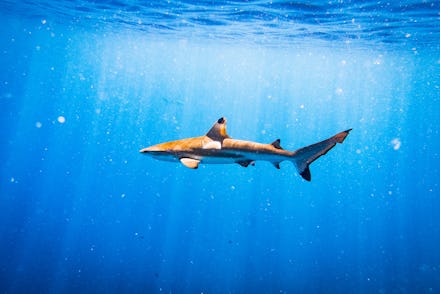Sharks in Australia have killed an alarming number of people this year, and no one knows why

2020 has been a banner year in all the wrong ways, and it's really starting to feel like the planet and some of its inhabitants have just about had it with humanity. The coronavirus pandemic likely originated from bats, murder hornets made their way across the Pacific Ocean to settle in Washington, and according to a New York Times report, sharks in Australia are behaving much more aggressively than usual. There have been eight deaths linked to shark attacks in the country this year, which is the most in nearly a century. Scientists believe that climate change might be contributing to the spike.
The most recent instance of a shark killing a human in Australia occurred last Sunday, when Charles Cernobori, a 59-year-old father of three, was body surfing at Cable Beach in Western Australia. According to a report from local news outlet WAToday, a shark bit into his arm and thigh. A couple walking the beach spotted him thrashing in the water after the attack and ran to help, dragging him onto the beach, but Cernobori passed away before emergency services arrived.
WAToday reported that the shark remained in shallow waters near the beach for nearly 30 minutes after the attack. That's not totally uncommon. Some sharks prefer to be in shallow water, especially when hunting for prey, because it allows them to rely on their sense of smell and electroreception, or ability to detect electrical fields from other creatures, rather than their vision. That can lead to sharks occupying the same waters as humans, because the waters around beaches often meet the conditions that sharks prefer to hunt in.
What is incredibly uncommon is the number of shark-related deaths that have been occurring in these waters. Humans are not part of a shark's standard diet, which has evolved over millions of years — well before humans ever even occupied the planet. When hunting for food, even in waters that are shared by humans, sharks are not drawn to our meaty flesh. They have a sense of smell for their prey, like seals or fish, but they are not drawn to humans in the same way. Most shark attacks are believed to be the result of sharks becoming confused or curious if they see a person splashing around, which they might mistake for potential prey.
All of that makes it particularly troubling that there have been so many deaths from shark attacks off the coast of Australia this year. With eight total reports so far, 2020 is getting close to tying the record for most shark-related deaths in the country. There were nine such fatalities recorded in 1929. In recent years, the numbers have been dwindling. On average, there is about one incident of a shark killing a human per year in Australia.
So why the uptick? There are a number of theories, but the increased number of attacks in Australia actually fall in line with some trends seen elsewhere. In Hawaii, a shark attack in Maui earlier this year caught experts off-guard. Earlier this year, a shark attack off the coast of North Carolina garnered national attention, in part because the state has experienced a surprising uptick in attacks in recent years. A study published last year found that the number of shark attacks have steadily been rising for decades now, particularly off the coasts of the US and Australia.
It's hard to ignore that the trend line seems to follow a similar upward trajectory as charts showing global temperature rise caused by climate change. And there is some evidence to suggest that climate change may be playing a role in the increased number of shark attacks. A study published in 2016 found that as the ocean warms, sharks are pushed northward where they seek waters that are more conducive to their hunting habits. At the same time, warmer temperatures lead to humans spending more time in the water, seeking to cool down on hot days. That leads to more interactions between humans and sharks and, in turn, more attacks.
Even though they are occurring at a much higher frequency than normal, shark attacks are still exceptionally rare events. Swimming in the shallow waters of the ocean is likely still safe, but that risk might increase if we don’t work to address climate change. And while shark attacks won’t go away if we manage to stave off the worst effects of the climate crisis, it sure can’t hurt to try.